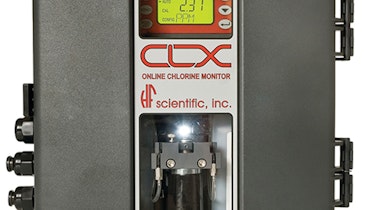
“Water runs through my blood,” says Lynn Campbell.
“And it probably ran through the blood of my ancestors.”
That’s not an overstatement. Campbell’s grandfather, father, brothers, uncles and cousins were well drillers and water system managers across the South. When public water and wastewater systems started growing, his father became manager of the wastewater system in Arab, Alabama.
Campbell has continued the tradition. He began as a teenager, working odd jobs and sometimes in the summer helping his father at the wastewater treatment plants. He began his water career in 1974. Today, as vice president of Water Resources Operations and Managed Maintenance in Columbus, Georgia, he oversees all above-ground assets.
Those include two water treatment plants, the wastewater treatment operation, two combined sewer overflow (CSO) treatment facilities, all water booster stations, 84 wastewater lift stations, and all above-ground storage tanks. He’s also responsible for 66 of the utility’s 280 employees and an annual budget of $14.5 million.
In managing this large operation, he has won recognition from peers, receiving the 1994 Georgia AWWA Operators Meritorious Service Award, the 2014 Georgia AWWA William J. Greene Award for service to the organization, and the Georgia AWWA 2015 George Warren Fuller Award for service to the water supply industry. He has also earned the 2011 Elizabeth McEntire Award from the Georgia Association of Water Professionals (GAWP) for industry service.
Getting started
The start of Campbell’s career more than four decades ago was less prestigious. “When I worked at my dad’s plant in the summer, he was always doing things to apply for and win the best operated plant award in Alabama — cleaning, cutting the grass, painting equipment,” Campbell says. “I helped with that. He drilled into me early that in order to win the award, you had to do things right.”
Campbell then took a job at the Northeast Morgan County water plant, a decision that proved fortuitous. “I was working at a Piggly Wiggly grocery store at the time, trying to make ends meet,” he says. “It was either that, a local manufacturing plant or water treatment.” He joined the county staff and earned his certification. He then moved on to chief operator at Muscle Shoals (Alabama) Utilities, to Phenix City, Alabama, and finally to his present location in Columbus.
“That was 1984,” Campbell recalls. “They had an opening for assistant superintendent at the water plant, so I came across the river.” Five years later he was superintendent, a few years after that manager of Water Resources Operations, then assistant vice president in the Water Resources Division. He assumed his current position in 2009.
He holds a long list of certifications and educational achievements. Besides Georgia Class I Water System and Class III Wastewater licenses, he holds water treatment certification for Alabama vocational education instructors, certification for Instructional Technology Water Treatment with the Georgia Water and Wastewater Institute, and a Water and Wastewater Leadership Certificate of Completion from the Kenan-Flagler Business School at the University of North Carolina. He is also a graduate of the GAWP Leadership Academy.
All about people
With a resume steeped in water, Campbell has a unique and far-ranging perspective on the challenges facing water and wastewater utilities and how to achieve success. To begin with, he hasn’t forgotten the importance of the operator and operator-management relationships.
“Operators like to be recognized for the job that they do and to be appreciated,” he says. “It is extremely important for the executive staff to provide the tools they need to do their job.” He believes the key to success in water treatment plant operation is a motivated and competent staff, anchored and supported by a management team that “strives to excel and do better than most other utilities.” Every plant Campbell has worked at has won at least one award for operational excellence.
Strategic planning has a lot to do with top-shelf performance, Campbell says. Columbus has made strategic planning part of its normal operation for more than 20 years: “We’ve been doing it for a long time. You just have to make it part of your culture. If you’re not changing, not doing anything, that doesn’t cut it in today’s world.”
At Columbus, strategic planning requires out-of-the-box thinking, along with discipline. The utility’s planning process focuses on six strategic initiatives: customer service, regional partnerships, information technology, optimizing infrastructure, a sustainable workforce, and financial stability.
“We develop goals and objectives for reaching the goals, and those goals lead us into the future,” Campbell says. “To the largest extent possible, we use benchmarking as an important part of our strategic planning. We currently track 27 performance indicators with other utilities or within our utility. That serves to assist on continuous improvement.”
Performance planning
Columbus also has a strategic planning department, which meets regularly and updates the strategic plan to the senior staff each quarter. “We have strategic teams for each initiative,” says Campbell. “Each team has a leader and five to six staff members.” The teams develop performance work plans for each of the objectives designed to achieve the stated goals.
“We look toward the future,” says Campbell. “We run the business strategically. Our planned capital improvement program is prepared with input from asset management, our facilities and IT master plans, and an energy gap analysis, anchored by our strategic plan. All this rolls up into a financial plan for the capital improvement program. The whole thing is one big process.
“Now when we have to raise rates to pay for infrastructure needs and construction, we have a basis for doing that.”
Columbus Water Works also employs the industry’s effective utility management (EUM) principles. These best practices dovetail with the Columbus utility’s strategic plan. The bottom line: “Strategic planning has enabled us to go forward in a strategic way,” Campbell says. “The result is sustainability and better customer service.”
Caring for customers
That brings up Campbell’s favorite topic — customers. “Customer service is our big thing,” he says. “Our goal is to provide the best customer service. Everything you do drives you to make that happen.”
Customer service is one of four major planks in the Columbus vision statement, along with protecting the environment, aspiring to new opportunities and being an outstanding provider of utility services. “It’s so important to have your customers’ buy-in,” Campbell says.
Stakeholder surveys help cement relationships: “In our process, each person on our management team interviews a stakeholder — our partners, business people, citizens. We ask what we’re doing right and what we’re doing wrong. We get them involved in our business.”
The utility also sends written surveys and conducts surveys over the phone.
In Campbell’s view, the more a water utility communicates, the better: “We always try to communicate what we’re doing and why we’re doing it.” That brings up the ticklish issue of rates and rate increases. “Our rates are generally low in the first place, so increases have not been so much of an issue,” Campbell says. “We benchmark our utility against others of our size in the Southeast, and our rates are usually third or fourth from the bottom. But when we do increase them, we want the community to buy in and understand that we have a need.”
Time to invest
At the same time, Campbell sees changes ahead in the cost of clean water: “Historically, water in most parts of the United States is very, very cheap as compared to other utilities such as power and natural gas. However, water utilities are faced with aging infrastructure. Water systems built in the 1960s and 1970s, for example, are just now starting to experience signs of aging, and huge capital expenditures are necessary to sustain these assets. Older and larger systems are facing even more of a challenge.”
For the most part, Campbell says, the only way to pay for improvements is through water rates, “unless by some miracle the federal government steps up and provides the funding.”
Throw in changing regulations that require different treatment technologies, and even more funds will be needed, he says.
“As Bob Dylan sang, ‘The Times They Are a-Changing.’ Cheap water may at some point become a thing of the past.”
Although he greatly enjoys what he’s doing, Campbell plans to retire in a couple of years.
He’s getting closer to the time to enjoy his grandchildren and do other things. Not surprisingly, those involve water: bass fishing and taking his family on his center-console boat down to St. Joe Bay in Florida for scalloping and snorkeling.
During those quiet moments, he’ll be able to reflect on a satisfying career that includes a legacy of industry service. Campbell has served on the GAWP Best Operated Plant Award Committee and Water Treatment Committee. He has also been part of the Georgia Water and Wastewater Agency Emergency Response Network and served on the Executive Committee for GAWWA. He is a member of GAWP 5-S Club.
“There’s a right way to do things, and not so right,” he says. “We are all about doing things the right way.”







